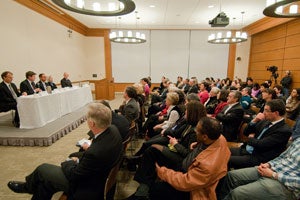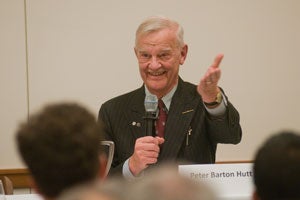A group of scholars gathered on Jan. 17 at HLS with Peter Barton Hutt ’59 to discuss and celebrate his career, including “20 years (thus far)” teaching an influential course at Harvard Law on food and drug law.
Hutt, who has worked at the Washington, D. C. law firm Covington & Burling for more than five decades has taught the course at HLS since 1993. He also served as chief counsel for the Food and Drug Administration from 1971 to 1973, is the co-author of a food and drug law casebook, serves on a variety of academic and scientific boards, and has been named to numerous top-lawyer lists.
“Besides teaching a stellar course, he has inspired people to write papers that get published that change the future,” said HLS Dean Martha Minow. “Peter has inspired people who are here who are on this panel and they represent a larger group that represents an extraordinary contribution to the field.”
Minow and Hutt were joined on the panel by I. Glenn Cohen ’03, assistant professor at HLS and co-director of Petrie-Flom Center for Health Law Policy, Biotechnology, and Bioethics; Theodore Ruger ’95, professor at the University of Pennsylvania Law School; and Lewis Grossman ’90, professor at American University Washington College of Law, who practiced with Hutt at Covington and was one of the coauthors on the third edition of Hutt’s casebook on food and drug law. Cohen and Ruger were students of Hutt’s at HLS.
The panelists discussed Hutt’s achievements and contributions to the field and to the generation of food and drug law scholars he has mentored.
Cohen said that Hutt’s teaching is marked by humor, generosity and investment in his students, and part of the return on that investment includes at least 83 papers written by Hutt’s students and published in law journals. (Since 2012, Hutt has posted a compendium of papers from the food and drug law class.)
Panelists also discussed Hutt’s own scholarly contributions, ranging from “a classic” 1972 article on the Food, Drug and Cosmetics Act to a 2008 article that looks at the effects of chronic underfunding of the FDA combined with its expanding statutory responsibility.
“The legislative process is often presented in an orderly fashion,” Cohen said. “The picture Peter paints in his historical scholarship is anything but that. It is the brass tacks, it is the way decisions really get made…[and how] those things inform the discussion of future problems.”

As a practitioner, Grossman said, Hutt shaped how the FDA operates. During his time as chief counsel in the 1970s, he used a provision of the FDCA to issue broad, forward-looking rules that would govern the agency’s enforcement of the law. This remains the process today, Grossman said, although agency ossification has made it more difficult.
With his many jobs—as teacher, scholar, private practitioner, and government lawyer—Hutt can be compared to a marathon juggler, Ruger joked—a person who juggles while running 26.2 miles.
“[He] is one of the last great generalists within the food and drug field,” Grossman said.
For Hutt though, the best month of the year is the one he spends at HLS to teach Food and Drug Law.
On the first day of his first class in 1993, Hutt said, he laid out the objectives for the course—the same objectives he has recited on the first day of every class since. They include showing students how the practice of law can be fun and getting them to appreciate the unlimited opportunity they have to make significant contributions to society and national policy.
“I want students to leave here with the desire to find the same passion in their lives that I have found in food and drug law in my life,” Hutt said. “They ought to go out there prepared to find what will drive them.”
